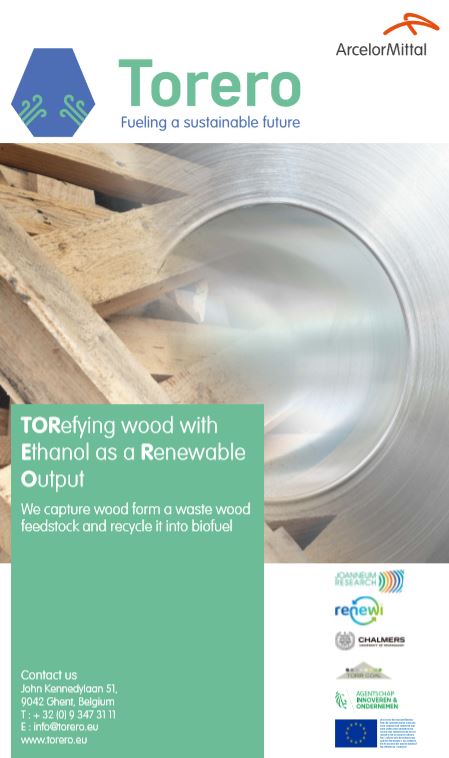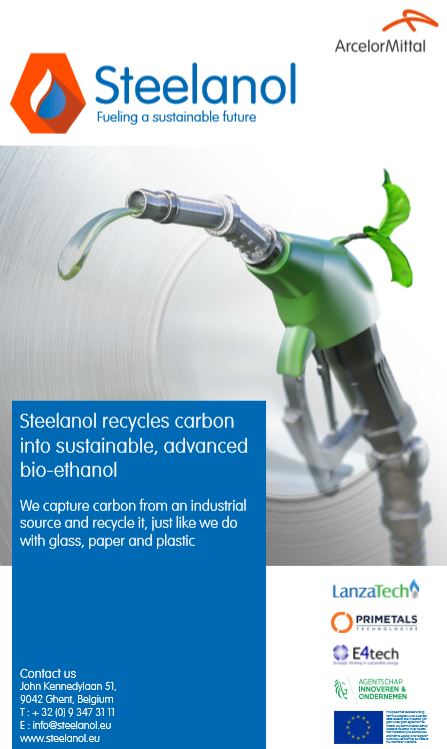World first: ArcelorMittal Belgium starts construction on two pioneering projects to further reduce carbon emissions
ArcelorMittal Belgium has started the construction of two new groundbreaking facilities at the Ghent site to reduce carbon emissions. The two installations represent a total investment of 160 million euros and will avoid approximately 400,000 tonnes of CO2 emissions per year in the first phase. For the financing, innovation support was obtained from, among others, the European Union and the Flemish government.

- Torero (TORefying wood with Ethanol as a Renewable Output)
The Torero plant will convert waste wood into biocarbon suitable for the blast furnaces process. We will thus reduce the injection of fossil pulverized coal, which will in turn reduce our CO2 emissions. It also offers an alternative to the current incineration of the particularly difficult waste wood stream. In the early stage, the Torero plant will convert 120,000 ton of waste wood into around 50,000 tonnes of biocoal every year.
The technology of the torrefaction process has been developed by the company Torr-Coal, and the waste wood will be supplied by Renewi.
For the construction of the new installation, up to 70 external jobs will be created and about 10 new permanent direct jobs will be created for the operation of this installation. The commissioning and first production are expected in the course of 2022.
2. Steelanol

Via the Steelanol plant, we will transform the carbon-containing gases from our blast furnaces into bioethanol to be used as fuel for transportation or even for the production of synthetic materials. This will be the first industrial installation of its kind in Europe, producing 80 million litres of bioethanol annually.
The technology in the gas conversion process was pioneered by Chicago-based company, LanzaTech, with whom ArcelorMittal has entered a long-term partnership. The technology licensed by LanzaTech uses microbes that feed on carbon monoxide to produce bioethanol.
For the construction of the new installation, up to 500 external jobs will be created and about 30 new permanent direct jobs will be created for the operation of this installation. The commissioning and first production are expected in the course of 2022.
The application of this microbial gas conversion system significantly advances ArcelorMittal’s carbon capture and storage (CCS) and carbon capture and utilization (CCU) capabilities and enhances steel’s role in the circular economy. ArcelorMittal’s long-term aspiration is to become a zero-waste business by further upscaling these innovations, with all materials used or generated during steel production recuperated, treated and reused in the production chain or becoming the raw materials for other industries. We do not want to limit ourselves to reusing our own waste, but we can also play a role in the processing of waste from other sectors.
Geert Bourgeois (Minister-President of the Flemish government): “These investments are proof that, within the heavy industry, it is possible to realise innovative and sustainable projects that have a positive impact on CO2 emissions, while at the same time creating additional jobs. In order to be able to produce the steel of the future and keep the companies in our midst, we need to take the lead in production innovation and cooperation between the public and private sectors.”
Manfred Van Vlierberghe (CEO ArcelorMittal Belgium): “We want to become the sustainable steel company of the future through new breakthrough technologies such as Torero and Steelanol. They contribute to strengthening our global leadership in terms of CO2 and energy efficiency in the steel sector.”
Carl De Maré (ArcelorMittal Group CTO – Head of Technology Strategy): “With Torero and Steelanol, we are committed to innovations that can prevent waste incineration on a large scale and that transform these streams into high-quality chemical products.”
ArcelorMittal is working together with specialized partners in order to roll out this bioethanol technology. Funding was obtained from various sources, including the European Union’s Horizon 2020 program, to carry out further research and development and scale up the project. The Flemish government also gave strategic ecological support via VLAIO, the Flemish Agency for Innovation and Enterprise.


